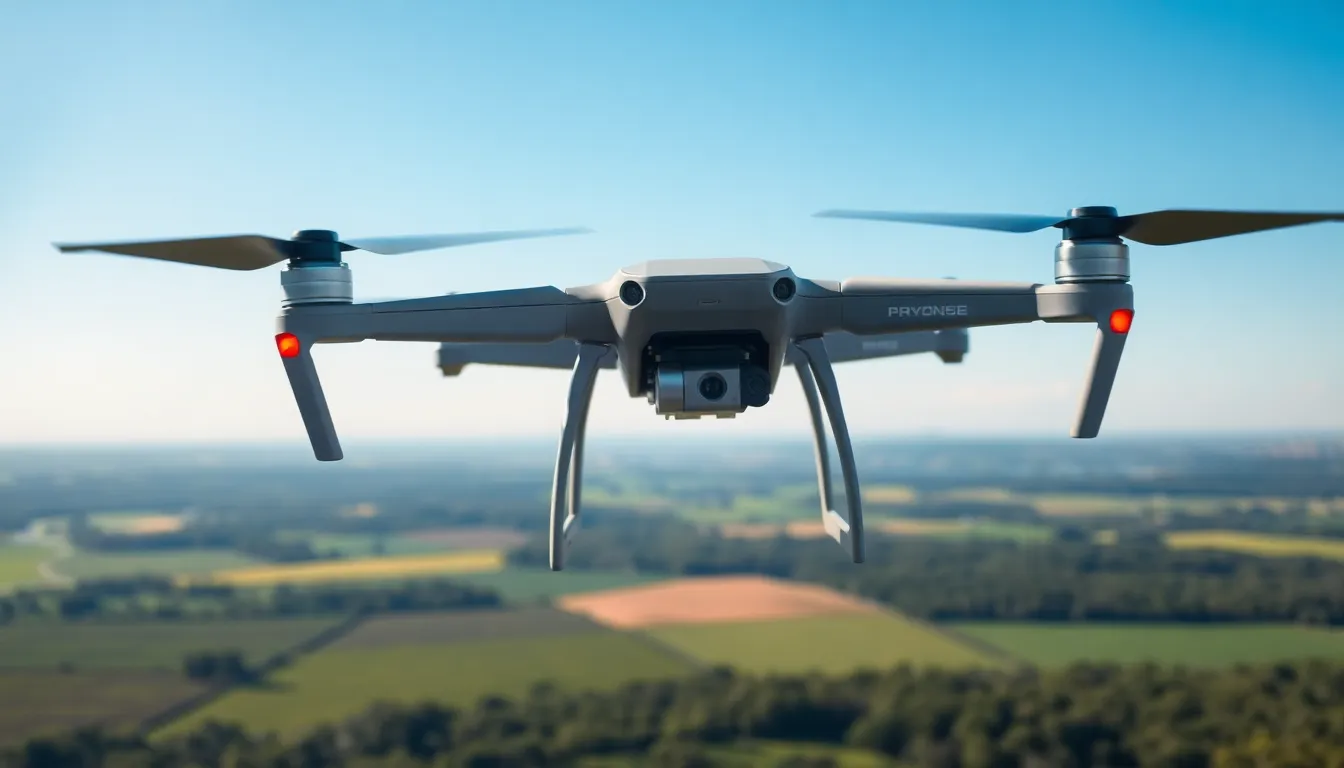In a world where technology often gets a bad rap, AI is stepping up to the plate to prove it’s not just a fancy gadget for tech geeks. Picture this: algorithms saving the environment, chatbots helping the homeless, and machine learning feeding the hungry. Sounds like the plot of a feel-good movie, right? But these AI social good projects are very real and making a tangible difference.
With a sprinkle of innovation and a dash of creativity, AI is transforming lives and communities around the globe. From predicting natural disasters to improving healthcare access, these projects are harnessing the power of artificial intelligence for the greater good. So buckle up and get ready to explore how AI is not just about robots taking over the world but about making it a better place for everyone.
Table of Contents
ToggleOverview of AI Social Good Projects
AI social good projects leverage machine learning and data analytics to address significant societal challenges. Organizations utilize these projects to harness AI’s capacity for processing vast amounts of data, making timely predictions, and offering actionable insights.
One prominent area is environmental conservation. AI technologies analyze satellite images to monitor deforestation, predict wildlife migrations, and optimize resource management. By employing AI-driven models, conservationists can make more informed decisions about protecting endangered species.
Healthcare access represents another vital focus. AI tools assist in diagnosing diseases, predicting patient outcomes, and managing treatment plans efficiently. For example, AI algorithms analyze medical images to detect conditions like cancer early, significantly improving patient survival rates.
Addressing homelessness, AI aids in identifying at-risk populations. Data collected from various social services allows organizations to predict which individuals might face housing insecurity. With this predictive capability, resources can be allocated more effectively, ensuring timely intervention.
Food security benefits from AI through enhanced agricultural practices. Machine learning algorithms optimize crop yields by analyzing weather patterns, soil conditions, and pest activity. Farmers gain insights that lead to improved outputs and reduced waste.
Disaster response illustrates AI’s potential to save lives. Real-time data analysis during natural disasters enables first responders to deploy resources efficiently. By predicting the paths of hurricanes or earthquakes, authorities can warn communities in advance.
AI social good projects exemplify how technology can create tangible benefits. These initiatives facilitate collaboration between governments, non-profits, and tech companies, proving that collective efforts can yield impactful solutions for persistent global challenges.
Key Areas of Impact

Artificial intelligence significantly influences various domains, driving projects that promote social good. These initiatives focus on improving healthcare, environmental sustainability, and educational accessibility.
Healthcare Innovations
Innovations in healthcare leverage AI to enhance patient outcomes and streamline processes. Machine learning algorithms identify early patterns in medical data, allowing for timely disease detection and personalized treatment plans. AI-powered tools assist medical professionals by analyzing imaging data faster than traditional methods do. Virtual health assistants, designed to provide guidance and support, help patients manage chronic conditions effectively. Telemedicine platforms utilize AI to connect patients with healthcare providers, improving access in underserved regions.
Environmental Sustainability
Sustainability efforts gain momentum as AI technologies contribute to environmental conservation. Data analytics supports wildlife preservation by monitoring animal populations and detecting poaching activities. Smart agricultural solutions enhance crop yield and reduce waste through precision farming techniques. AI models predict climate patterns, assisting researchers in developing strategies for mitigating impacts. Moreover, energy management systems optimize resource usage in buildings, lowering carbon footprints and promoting green initiatives.
Education and Accessibility
AI applications transform education by personalizing learning experiences for students. Intelligent tutoring systems adapt to individual learning needs, ensuring students grasp complex subjects effectively. These tools analyze performance data, providing educators with insights to tailor their teaching methods. Accessibility for disabled individuals improves with AI-driven technologies, enabling voice-controlled devices and automated transcription services. Assistive learning tools provide support in real-time, fostering inclusive environments for diverse learners.
Notable AI Social Good Projects
Numerous AI social good projects are making significant strides in addressing societal challenges. These innovative initiatives demonstrate the positive impact of AI across various sectors.
Project A: Description and Impact
Project A focuses on using machine learning algorithms to predict natural disasters. By analyzing weather patterns and historical data, this project enhances early warning systems. Communities benefit from timely alerts, allowing them to prepare for hurricanes, floods, and earthquakes. As a result, fatalities and property damage decrease significantly. For instance, in regions susceptible to severe storms, timely alerts have shown up to a 30% reduction in casualties. Collaboration with local governments ensures that at-risk populations receive crucial information.
Project B: Description and Impact
Project B aims to improve healthcare accessibility through AI-driven telemedicine solutions. With advanced algorithms, the project matches patients with appropriate healthcare providers based on individual needs and conditions. This initiative addresses barriers faced by underserved communities, including geographic limitations and healthcare shortages. Data indicates that patients engaging with AI-assisted telemedicine experience up to 40% faster diagnosis and treatment. The integration of AI technology enhances patient outcomes by streamlining processes and facilitating personalized care. Partnerships with healthcare organizations amplify the project’s reach and effectiveness.
Challenges and Considerations
AI social good projects face various challenges and considerations that can impact their effectiveness.
Ethical Implications
Ethical issues arise in AI applications, particularly regarding data privacy and security. Stakeholders must ensure that sensitive information is handled responsibly to protect vulnerable populations. Bias in algorithms poses another significant risk, leading to unfair outcomes. Developers and organizations need to continually assess their models to mitigate these biases. Transparency becomes key, as users and beneficiaries must understand how AI systems make decisions. Establishing guidelines for ethical AI use can help navigate these complex issues, promoting trust and collaboration among all parties involved.
Technological Limitations
Technological constraints often hinder the advancement of AI social good initiatives. Limited access to reliable data can negatively impact the accuracy and efficacy of AI models. Many regions, especially underserved communities, lack the necessary digital infrastructure, affecting implementation. Scalability presents another challenge, as successful projects may struggle to expand to larger populations without significant resources. Additionally, AI systems require ongoing maintenance and updates, which can complicate long-term sustainability. Addressing these limitations is essential for harnessing AI’s full potential in driving social change.
Future of AI Social Good Projects
Anticipated advancements in AI technology promise significant enhancements in social good projects. Experts predict that machine learning algorithms will become more sophisticated, improving predictions related to natural disasters and disease outbreaks. Increased collaboration among tech companies, non-profits, and governments enhances the potential for impactful solutions.
Healthcare could evolve with AI-driven systems providing personalized treatment plans. These innovations might lead to more accurate diagnoses and better health outcomes, especially in underserved areas. Additionally, the expansion of telemedicine could democratize healthcare access, reaching populations with limited resources.
Environmental projects are also set to benefit from evolving AI capabilities. Improved monitoring systems for deforestation and wildlife conservation will likely take center stage. Data analytics could optimize resource management, aiding sustainability efforts significantly while reducing the carbon footprint.
Education represents another area of growth for AI social good initiatives. Adaptive learning technologies can tailor educational experiences to individual student needs. Tools that facilitate accessibility for disabled individuals will open doors to quality education for everyone.
Despite the potential, challenges related to ethical concerns must be addressed. Transparency in data use and algorithmic fairness remains crucial for building trust in these systems. Furthermore, enhancing data accessibility and digital infrastructure is essential for scaling initiatives globally.
Funding and policy support will play an important role in the future of AI social good projects. Continuous investment in research, development, and community engagement creates pathways for innovative solutions. These factors combined will shape a more equitable and sustainable future through the power of AI.
AI social good projects are paving the way for transformative change across various sectors. By leveraging technology to tackle critical issues like healthcare access and environmental sustainability, these initiatives demonstrate AI’s potential to create a positive impact on society. As advancements continue, the collaboration between tech companies and non-profits will be vital in overcoming challenges and ensuring ethical practices.
The future holds promise for more innovative solutions that not only address immediate needs but also foster long-term sustainability. With ongoing support and commitment from all stakeholders, AI can truly become a powerful ally in building a better world for everyone.





